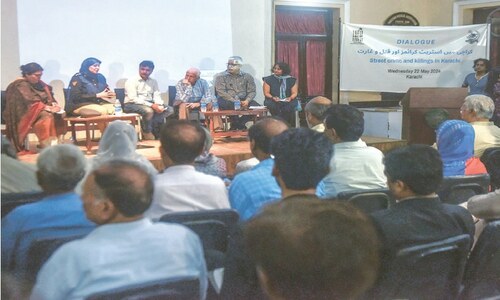KARACHI: Given that the organisers of the play Aik diary jo kho gai delayed its production because they wanted to cast the right performers for the drama adopted from Neil Simon’s Brighton beach memoirs, it was pretty disappointing to see that the actors looked under-prepared on stage during their performance for the media at the National Academy of Performing Arts theatre on Wednesday night.
Directed by Rahat Kazmi and translated into Urdu by Samina Nazir, Aik diary jo kho gai (the lost diary) is set in the late 1980s against the backdrop of the Dhaka Fall and the post-1971 identity issues, on individual and collective levels, faced by members of a Bihari family. Although there are moments of humour in the story which draw out laughter, the play has serious underpinnings. It examines, or strives to do so, the issue of cultural and political dislocation which is always heightened by the quandary of settling into a new home, in this case (West) Pakistan, with unfamiliar surroundings.
The narrator of the story is Kaleemuddin (Ahmer Hussain), the younger son of Moinuddin (Akbar Islam) and Shakila (Bakhtawar Mazhar). Kaleemuddin, fondly called Kalimwa by his mother, keeps a diary in which he records the important events taking place in the household.
Shakila’s younger sister Rabia Kalam (Zarqa Naz) lives with the Moinuddin family with her two daughters, Amina (Jia Khan) and Jasmine (Erum Bashir). Rabia’s Bengali husband, Kalam, had passed away, leaving bitter memories for her, which is often a reference point for Shakila to recall the bitter experiences that the entire clan had in East Pakistan. Shakila doesn’t hesitate badmouthing other ethnic groups (Bengalis, Pathans, etc) hinting at the fact that she’s bruised by events that unfolded when Bangladesh hadn’t come into being.
But the tensions in the play come to the fore when it is revealed that Moinuddin’s older son Farid (Tariq Raja) has locked horns with his boss by taking a principled stand for a poor man in the office. This unveils the financial difficulties that the family is already confronting. To boot, Moinuddin’s kiosk (pathara), his part-time arrangement to earn a little extra amount of money, has also been thrown away by the authorities, adding to his financial woes.
In other strands of the story, an Afghan neighbour is interested in marrying Rabia, which Shakila initially opposes vehemently. Amina is trying to make it into the film industry, despite not being 18 years of age. Kaleemuddin is romantically inclined towards Amina but she’s become too headstrong a girl for him in pursuit of her goal. Things gather momentum when the two sisters (Shakila and Rabia) develop differences after the Afghan neighbour meets with an accident, forcing his mother to write a letter to Rabia stating he can’t marry her.
Aik diary jo kho gai suffers on many counts. Since it was a preview show on Wednesday, let’s overlook the technical blunders and the knocking over of a lamp by an actor. The chief disappointment is the script which doesn’t commensurate with quite a few important underlying themes embedded in the plot.
The dialogue is pedestrian, save for the part when Kaleemuddin is alluding to his puberty-related matters. Then the research work is shoddy. The young Kaleem, who doesn’t know much about life as yet, talks about the dissolution of the Soviet Union in 1987, at least four to five years prior to the actual dismemberment of the USSR. He gives references of the tragedy of Oedipus Rex as well, something unlike his character. One wonders, how a seasoned theatre person like Rahat Kazmi could let go of such tall pronouncements.
Also, it was strange to notice that while the story pivots around a Bihari household, not a single member speaks Urdu in the lilting Bihari accent. Shakila sounds more like a Dilli-wala and Rabia, someone from Madhya Pradesh.
No actor stood out, as all of them struggled to deliver their lines properly on Wednesday. Ahmar Hussain’s performance was well received perhaps because of the nature of his role.
The play will run till Feb 1, from Thursday to Sunday.
Published in Dawn, January 15th, 2015
On a mobile phone? Get the Dawn Mobile App: Apple Store | Google Play















































Dear visitor, the comments section is undergoing an overhaul and will return soon.